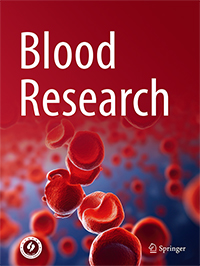Review Article
 Split Viewer
Split Viewer
Korean J Hematol 2012; 47(1):
Published online March 31, 2012
https://doi.org/10.5045/kjh.2012.47.1.17
© The Korean Society of Hematology
Cellular immunotherapy using dendritic cells against multiple myeloma
1Research Center for Cancer Immunotherapy, Chonnam National University Hwasun Hospital, Hwasun, Korea.
2Department of Hematology-Oncology, Chonnam National University Hwasun Hospital, Hwasun, Korea.
3Vaxcell-Bio Therapeutics, Hwasun, Korea.
Correspondence to : Correspondence to Je-Jung Lee, M.D., Ph.D. Department of Hematology-Oncology, Chonnam National University Hwasun Hospital, 322, Seoyangro, Hwasun 519-763, Korea. Tel: +82-61-379-7638, Fax: +82-61-379-7626, drjejung@chonnam.ac.kr
This is an Open Access article distributed under the terms of the Creative Commons Attribution Non-Commercial License (http://creativecommons.org/licenses/by-nc/3.0/) which permits unrestricted non-commercial use, distribution, and reproduction in any medium, provided the original work is properly cited.
Cellular therapy with dendritic cells (DCs) is emerging as a useful immunotherapeutic tool to treat multiple myeloma (MM). DC-based idiotype vaccination was recently suggested to induce idiotype-specific immune responses in MM patients. However, the clinical results so far have been largely disappointing, and the clinical effectiveness of such vaccinations in MM still needs to be demonstrated. DC-based therapies against MM may need to be boosted with other sources of tumor-associated antigens, and potent DCs should be recruited to increase the effectiveness of treatment. DCs with both high migratory capacity and high cytokine production are very important for effective DC-based cancer vaccination in order to induce high numbers of Th1-type CD4+ T cells and CD8+ cytotoxic T lymphocytes. The tumor microenvironment is also important in the regulation of tumor cell growth, proliferation, and the development of therapeutic resistance after treatment. In this review, we discuss how the efficacy of DC vaccination in MM can be improved. In addition, novel treatment strategies that target not only myeloma cells but also the tumor microenvironment are urgently needed to improve treatment outcomes.
Keywords Cellular immunotherapy, Dendritic cell, Multiple myeloma, Cytotoxic T lymphocyte, Immune response
Article
Review Article
Korean J Hematol 2012; 47(1): 17-27
Published online March 31, 2012 https://doi.org/10.5045/kjh.2012.47.1.17
Copyright © The Korean Society of Hematology.
Cellular immunotherapy using dendritic cells against multiple myeloma
Thanh-Nhan Nguyen-Pham1,2, Youn-Kyung Lee1,3, Hyun-Ju Lee1, Mi-Hyun Kim1,3, Deok-Hwan Yang1,2, Hyeoung-Joon Kim2, and Je-Jung Lee1,2,3*
1Research Center for Cancer Immunotherapy, Chonnam National University Hwasun Hospital, Hwasun, Korea.
2Department of Hematology-Oncology, Chonnam National University Hwasun Hospital, Hwasun, Korea.
3Vaxcell-Bio Therapeutics, Hwasun, Korea.
Correspondence to: Correspondence to Je-Jung Lee, M.D., Ph.D. Department of Hematology-Oncology, Chonnam National University Hwasun Hospital, 322, Seoyangro, Hwasun 519-763, Korea. Tel: +82-61-379-7638, Fax: +82-61-379-7626, drjejung@chonnam.ac.kr
This is an Open Access article distributed under the terms of the Creative Commons Attribution Non-Commercial License (http://creativecommons.org/licenses/by-nc/3.0/) which permits unrestricted non-commercial use, distribution, and reproduction in any medium, provided the original work is properly cited.
Abstract
Cellular therapy with dendritic cells (DCs) is emerging as a useful immunotherapeutic tool to treat multiple myeloma (MM). DC-based idiotype vaccination was recently suggested to induce idiotype-specific immune responses in MM patients. However, the clinical results so far have been largely disappointing, and the clinical effectiveness of such vaccinations in MM still needs to be demonstrated. DC-based therapies against MM may need to be boosted with other sources of tumor-associated antigens, and potent DCs should be recruited to increase the effectiveness of treatment. DCs with both high migratory capacity and high cytokine production are very important for effective DC-based cancer vaccination in order to induce high numbers of Th1-type CD4+ T cells and CD8+ cytotoxic T lymphocytes. The tumor microenvironment is also important in the regulation of tumor cell growth, proliferation, and the development of therapeutic resistance after treatment. In this review, we discuss how the efficacy of DC vaccination in MM can be improved. In addition, novel treatment strategies that target not only myeloma cells but also the tumor microenvironment are urgently needed to improve treatment outcomes.
Keywords: Cellular immunotherapy, Dendritic cell, Multiple myeloma, Cytotoxic T lymphocyte, Immune response
Fig 1.

Key points to improve DC vaccination in cancer patients. Abbreviations: CTL, cytotoxic T lymphocyte; DCs, dendritic cells; TA, tumor antigen; LNs, lymph nodes; Treg, regulatory T cell; MDSC, myeloid-derived suppressor cell.
-
Table 1 . Summary of clinical studies using DC-based vaccinations..
Abbreviations: DC, dendritic cell; TA, tumor antigen; imDC, immature DC; Mo-DC, monocyte-derived DC; Id, idiotype; mMo-DC, mature Mo-DC; KLH, keyhole limpet hemocyanin; CTL, cytotoxic T lymphocyte; PD, progressive disease; PR, partial response; SD, stable disease; CR, complete response..

Article Tools
Stats or Metrics
Related articles in BR
-
Recent advances in cellular immunotherapy for lymphoid malignancies
Haerim Chung, Hyunsoo Cho
Blood Res 2023; 58(4): 166-172 -
Advantage of achieving deep response following frontline daratumumab-VTd compared to VRd in transplant-eligible multiple myeloma: multicenter study
Ja Min Byun, Sung-Soo Park, Sung-Soo Yoon, Ari Ahn, Myungshin Kim, Jung Yeon Lee, Young-Woo Jeon, Seung-Hwan Shin, Seung-Ah Yahng, Youngil Koh, Chang-Ki Min
Blood Res 2023; 58(2): 83-90 -
Epigenetic and genetic investigation of SOCS-1 gene in patients with multiple myeloma
Fatıma Ceren Tuncel, Istemi Serin, Sacide Pehlivan, Yasemin Oyaci, Mustafa Pehlivan
Blood Res 2022; 57(4): 250-255




 PDF
PDF Standard view
Standard view Export citation
Export citation Share
Share  Download
Download Previous Article
Previous Article



